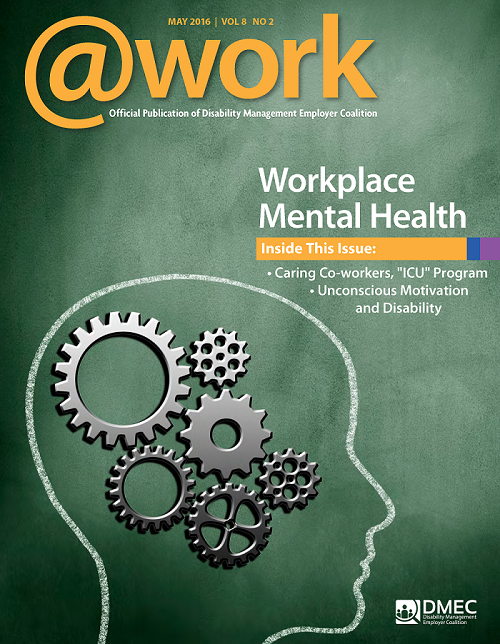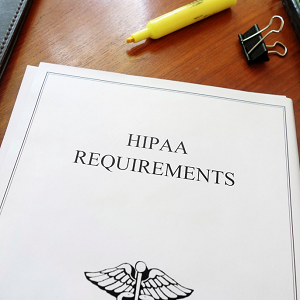
May 2016
Workplace Mental Health
As depression, stress, and other mental health issues continue to grow, programs and resources to assist employees are vital. This issue features a host of information and resources to address mental health in your organization.
Features
Free Resource for Employers: ICU Program Unleashes the Power of Caring Co-workers
“ICU” is an award-winning mental health program originally developed at DuPont and now offered free by the Partnership for Workplace Mental Health. The program provides a simple training that prepares employees to recognize signs of distress among co-workers, provide personal support, and encourage use of company mental health resources. Read more.

Unconscious Motivation and Disability: Didn’t Freud Leave the Building Already?
Freud may be long dead, but his idea that many of our behaviors are driven by unconscious motivations has stood the test of time. Many disability claimants who present with physical symptoms are actually solving psychological conflicts with their symptoms, but it is unfortunately often confused with malingering. Read more.

Spotlight Articles
Program Showcase: Hennepin County, MN, implements Workplace Possibilities Program by Standard Insurance Co.
Stress with depression, anxiety, worry, and even panic has become a common problem in today’s workplace. In any year, approximately 7% of the American workforce experience major depressive disorder. Return to work from a mental health absence can be challenging even in a “simple” case. Read more.

RTW Case Study: Johnson & Johnson
Smartphones, tablets, laptops, even watches that can check email — modern technology keeps us connected to the workplace 24/7. These amazing technologies give us avenues to work faster, retrieve information more conveniently, and stay connected to our peers around the world day or night. We can all agree that the use of technology has great benefits. But can excessive connectivity lead to stress and work/life imbalance? Read more.

Compliance Makeover: Job Accommodation Network Adds New Employer Resource
To better assist employers with Americans with Disabilities Act (ADA) compliance, the Job Accommodation Network (JAN) is adding an ADA program development module to its free services. While presenting tools and strategies for managing individual ADA accommodations to employers, JAN took note of DMEC’s approach to integrated absence management (IAM). Read more.

Columns
Employee Engagement During SAW & RTW: ADA and FMLA Decisions – Get the Medical Information You Need
An employer cannot effectively consider alternatives to leave of absence if it doesn’t understand the employee’s medical condition and related work limitations. The ADA and the FMLA can be minefields when medical information is requested, but employers are permitted to obtain medical information necessary to make decisions. Read more.

Advocating Care and Compliance: Preventing Drug Addiction Among Injured and Ill Employees
Opioid overuse has become a U.S. crisis, raising employers’ concerns about related work injuries and absence, productivity, job safety, and liability for actions of affected employees. In workers’ compensation treatment, an advocacy approach can help injured and ill workers return to healthy, productive lives without opioids. Read more.

Employee Well-Being: Workplace Depression and Strategies for Employee Well-Being and Productivity
Approximately 10% of the population experiences depression within a given year and could become the leading cause of the health burden by 2030. Depression generally resolves with proper care, but of all people diagnosed with depression every year, only 29% inquire about care and even fewer receive treatment. Read more.

Electronic Security & Privacy: Is HIPAA for Healthcare Organizations Only? What About Employers?
The most talked about and feared privacy and security regulation is certainly the Health Insurance Portability and Accountability Act (HIPAA). Many employers fear that HIPAA applies to them simply because they handle medical information as part of their benefits program, but that is not the criteria. Read more.

Employment Law: Designating FMLA Retroactively – Risks and Rewards for Employers
A client recently called me with a question that has become far too common in FMLA administration. The employer forgot to send the proper FMLA notices when the employee took leave after a workplace injury. When the employer failed to provide these notices, it lost the ability to count the lengthy absence as FMLA. Or did it? Read more.

Empowering Disability: Economic Dilemmas for Employers When Supporting Workers with Disabilities
Employers may look at disability as a progressive process. Short-term disability can lead to long-term disability, which can lead to Social Security Disability Insurance benefits. It’s fair to say, however, that the economic climate, trends, and demographics going forward may lead to a significant shift in this environment for employers. Read more.

Overcoming the Disability Epidemic: Mental Health and the Engaged Workplace
Employers cannot afford to ignore the impact of mental health and well-being in the workplace. Employers have a number of ways to address these costs, including attention to behavioral factors in absence management programs, utilizing EAP more widely in employee wellness, and creating a work environment that supports genuine engagement. Read more.

Straight Talk About Absence Management: Assistive Technology – Overlooked and Undervalued
Transitional work duties and schedules are powerful tools in the RTW or stay-at-work toolkit, but they aren’t the only ones. We’ve all but forgotten assistive technology. It is easy to see how technology can overcome a physical disability. But what about people with what insurers often call “mental and nervous” disorders? Their disabilities don’t seem supportable by technological solutions. Read more.

Departments
The CEO’s Desk: Delivering On Our Commitments
With the theme of workplace mental health in this issue of @Work magazine, DMEC is bringing fresh energy to our long-standing commitment to equip employers in this important area, including the 2016 Behavioral Health Survey and an employee well-being preconference program at the annual conference. Read more.

DMEC News: May 2016
DMEC is responding to the rising demand for qualified professional leave managers by offering a new designation, the Certified Leave Management Specialist (CLMS). The online self-paced course that serves as the foundation and training for the designation will launch in Fall 2016. Read more.

Compliance Memos: May 2016
The May 2016 compliance memos cover email notices for HIPAA audits, ERISA and state regulations, length of time employers are required to hold positions, and reducing work hours to avoid paying for medical benefits. Read more.




